Key takeaways:
- Setting personal goals provides clarity, motivation, and a sense of accomplishment, transforming feelings of overwhelm into actionable steps.
- Tracking data is essential to understand progress, identify patterns, and foster a sense of ownership over one’s journey.
- Adjusting goals based on insights and celebrating small victories enhances motivation and ensures a sustainable approach to personal growth.

Why Set Personal Goals
Setting personal goals is crucial because it gives us clarity and direction in life. I remember a time when I felt lost after graduating; I had no clear path, and it was unsettling. By setting specific goals, I discovered not just what I wanted to achieve, but also the steps I needed to take to get there. Can you recall a moment when you felt overwhelmed by the vastness of choices? Having personal goals transforms that chaos into manageable, purposeful actions.
Moreover, personal goals are essential for motivation. In my own experience, whenever I’ve faced setbacks, revisiting my goals reignites my passion. It’s that spark of ambition that turns a mundane task into a stepping stone toward something bigger. Have you ever found yourself in need of a reminder of why you started? Each goal serves as a beacon, guiding us through challenges and helping us stay committed to our aspirations.
Lastly, personal goals foster a sense of accomplishment. I distinctly remember the rush of pride I felt when I completed a fitness challenge I once thought was impossible. Each small victory along the way built my confidence and propelled me to aim even higher. Isn’t it satisfying to look back and see how far you’ve come? Setting personal goals allows us to celebrate those milestones and ultimately leads to a deeper understanding of our capabilities.
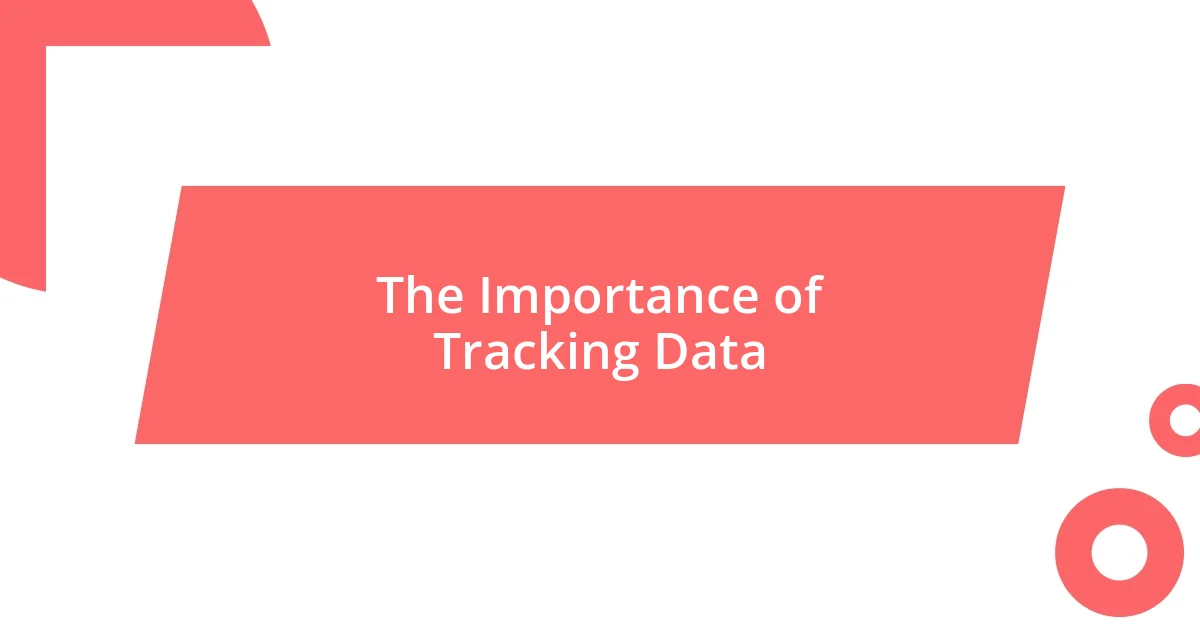
The Importance of Tracking Data
Tracking data is foundational in understanding our progress toward personal goals. In my experience, having tangible metrics helps me see where I stand, which can be a game changer. For instance, when I tracked my daily steps, it not only kept me accountable but also motivated me to hit new targets. Have you ever noticed how seeing numbers can inspire you to push a little harder?
Data also reveals trends and patterns that might otherwise go unnoticed. I recall a period when I was trying to improve my productivity. By logging my work hours, I discovered peak times when I was most effective. Recognizing this pattern allowed me to adjust my schedule, which resulted in a noticeable boost in my output. Isn’t it fascinating how simple data collection can lead to significant improvements in our daily lives?
Moreover, tracking data encourages a sense of ownership over our journey. When I track my weight loss, for example, I feel more in control of my choices and behaviors. Each drop in the scale doesn’t just represent a number; it reflects the culmination of my hard work and commitment. How empowering is it to witness your efforts translate into real-life results?
| Reasons for Tracking Data | Personal Experience |
|---|---|
| Accountability | Tracking my steps motivated me to reach daily targets. |
| Identifying Patterns | Logging my work hours doubled my productivity by adjusting my schedule. |
| Sense of Ownership | Seeing my weight loss progress empowered me to stick with my plans. |
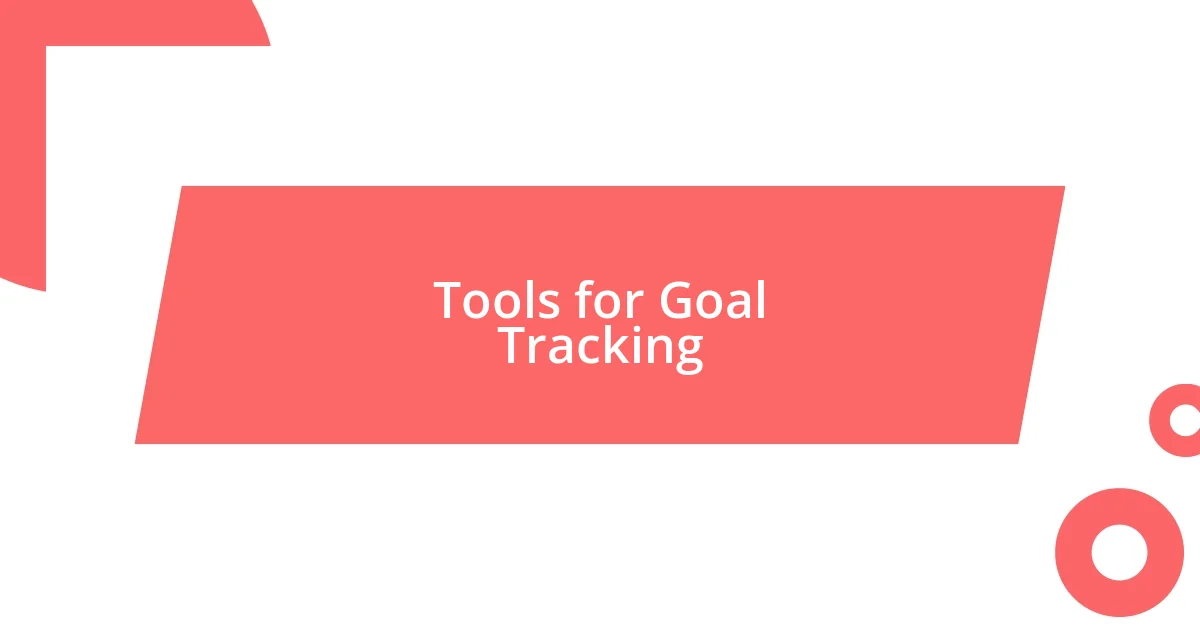
Tools for Goal Tracking
Tools for Goal Tracking
There’s a universe of tools available that can help streamline the process of tracking personal goals. For me, using the right tools enhances my motivation and keeps me on the right path. Over time, I’ve experimented with various apps and platforms, which made a significant difference in how I visualize my progress. I’ve learned that the right tool can transform a daunting task into an engaging journey. It’s almost like having a personal cheerleader in my pocket!
Here are some tools I recommend exploring:
- Habit Trackers (e.g., Habitica, Streaks): I found turning my goals into habits helps develop consistency. When I gamified my goals with Habitica, I felt more like a player in my own adventure.
- Journaling Apps (e.g., Day One, Penzu): I pour my thoughts into journaling apps to reflect on my journey. It’s cathartic and allows me to celebrate even the smallest victories.
- Project Management Tools (e.g., Trello, Asana): These help me break down larger goals into actionable tasks. The satisfaction of checking off a task is exhilarating for me.
- Spreadsheets (e.g., Excel, Google Sheets): For those who love data, spreadsheets can be a powerful way to track progress and trends. I once created a simple sheet, and just seeing the numbers shift was enough to motivate me substantially.
- Visualization Tools (e.g., Canva, MindMeister): I enjoy creating visual boards. They not only look good but they keep my goals right in front of me, reminding me daily of my aspirations and dreams.
By leveraging these tools, my journey toward achieving my personal goals became more structured and visually rewarding. It’s thrilling to see progress unfold right before my eyes!
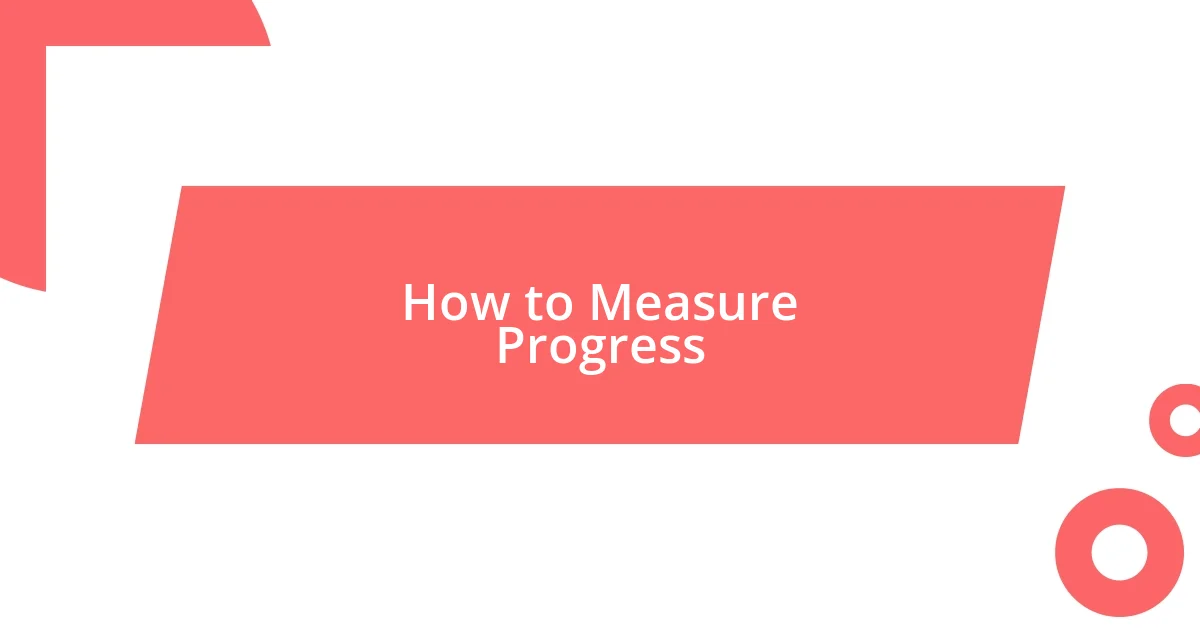
How to Measure Progress
Measuring progress is an essential part of tracking goals. I often find myself using specific metrics that resonate with my personal objectives. For instance, when I decided to learn a new language, I set milestones based on vocabulary tests. Every time I met a milestone, it not only confirmed my growth but also fueled my excitement to push further.
Another practical method I’ve used is journaling my achievements. Writing down what I accomplish each week gives me a sense of closure and celebration. Recently, after consistently showing up for my fitness routine, I noted how many workouts I completed each month. Looking back at that list filled me with pride and kept the momentum going. How often do you take a moment to honor your small wins?
Sometimes, visual representations are my favorite tools for measurement. When I trained for a marathon, I created a colorful chart to track my mileage. Watching those numbers climb higher was thrilling and served as a powerful reminder of my commitment. It’s interesting, isn’t it, how visual progress can evoke such strong emotions and drive us to achieve more? The thrill of seeing those little squares get filled in kept me motivated even on tough training days.
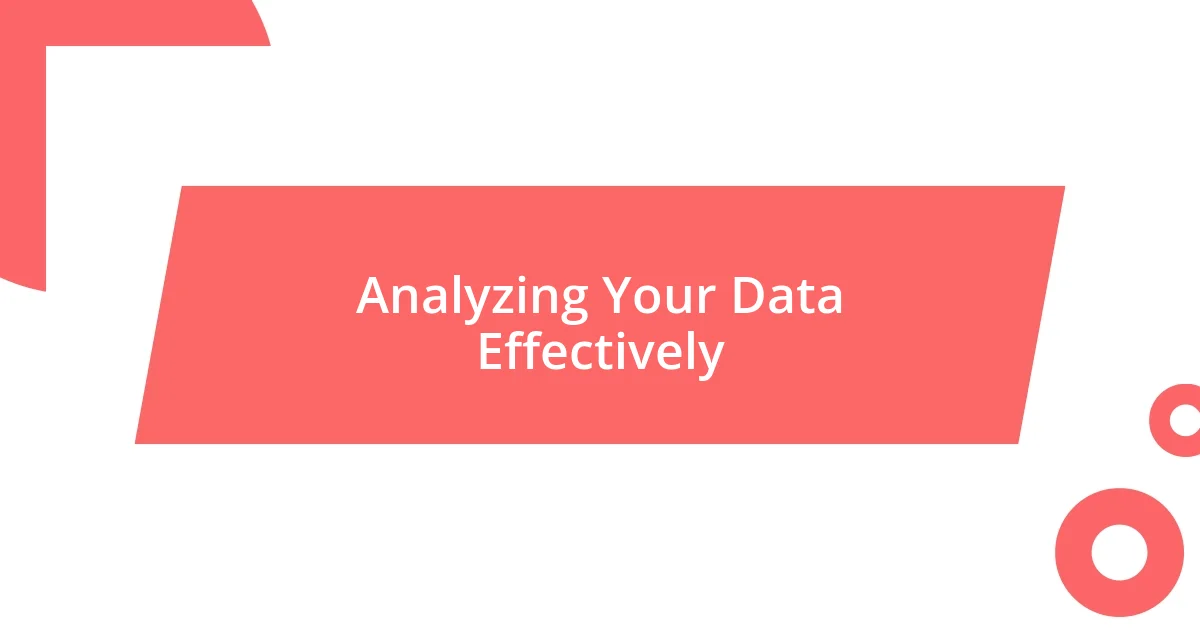
Analyzing Your Data Effectively
When I analyze my data, I find that breaking it down into manageable chunks is incredibly helpful. For example, when tracking my writing goals, I categorize my progress by word count, time spent writing, and completed projects. This granular approach not only clarifies where I stand but makes it easier to identify trends and patterns. I often ask myself, “What changes can I make to improve my output?” This reflection helps keep my focus sharp.
An intriguing aspect of data analysis is the emotional connection it creates. Recently, while reviewing my fitness data, I noticed that my running pace improved significantly over a few months. This wasn’t just satisfying from a numbers perspective; it ignited a personal sense of achievement. The thought, “I’ve come so far,” resonated deeply with me and pushed me to set even higher goals. How often do we overlook the emotional aspect of tracking achievements?
Visualizations are also a game changer for my analytical process. I often create graphs that depict my progress over time, and there’s something magical about seeing my efforts come to life in color and shapes. When I plotted my savings over several months, the upward trend felt like a powerful reminder of my determination. This visual feedback acts as a motivator, prompting me to keep pushing towards my financial targets. Have you ever seen a graph that made you feel like you were on top of the world? It’s those little triumphs that keep the fire burning!

Adjusting Goals Based on Insights
Adjusting my goals based on insights gleaned from data has been a transformative process for me. Just a few months ago, I was focused on increasing my reading volume, aiming for one book a week. But as I tracked my progress, I realized that the quality of my engagement was suffering; I was racing through titles instead of savoring them. So, I recalibrated my goal to aim for just two books a month, allowing me to dive deeper into each one. It was an important lesson for me: sometimes, slowing down can bring richer rewards.
I often find that the data can reveal unexpected insights that lead me to tweak my goals in unexpected ways. For instance, while tracking my meditation practice, I noticed that I felt more grounded when I practiced for shorter periods consistently than when I attempted longer sessions sporadically. This revelation encouraged me to adjust my target from 30 minutes a day to a more achievable 10 minutes daily. Isn’t it fascinating how understanding our own habits can reshape our journey? Suddenly, that small commitment seemed far more attainable and enjoyable.
Moreover, having regular check-ins with myself is crucial after making adjustments. I’ve developed a habit of reassessing my aims at the end of each month, reviewing both my successes and setbacks. Once, I found that an ambitious running goal led to overwhelming stress. Asking myself, “Is this actually serving my well-being?” prompted me to scale back. I shifted my focus from distance to enjoying my time outdoors, which reignited my passion for running. Adjusting my goals isn’t about sacrificing ambition; it’s about fostering sustainability in my journey. What have you discovered about your own goals when you pause to reflect?
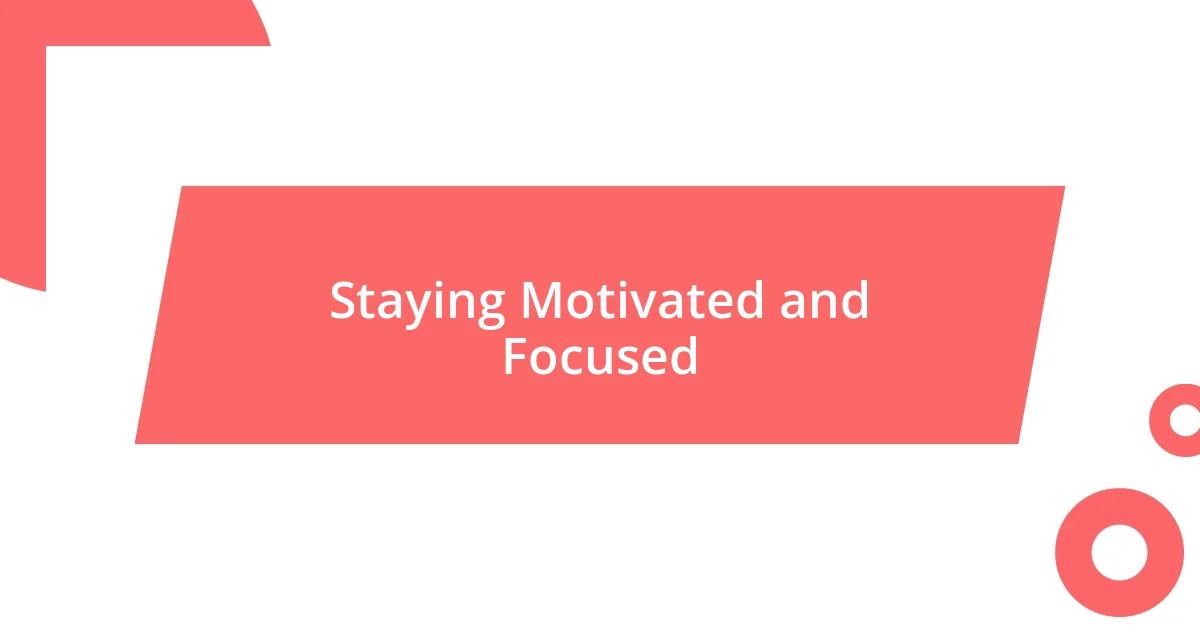
Staying Motivated and Focused
Staying motivated is a dance between setting achievable targets and celebrating milestones. I remember when I tackled my personal fitness goals; it was crucial for me to find little victories along the way, like increasing my lifting weights or running a faster mile. Each small success re-energized my commitment, and I often found myself asking, “What can I celebrate today?” This simple reflection made every step feel worthwhile, enhancing my motivation.
Focusing on my goals requires continuous reflection. I’ve learned the power of keeping a gratitude journal where I write down not just my achievements, but the feelings tied to them. There were days when I felt like giving up, but flipping through those pages reminded me of my journey’s worth. Have you ever noticed how recognizing progress also breeds persistence? It’s an easy way to shift perspective and keep my eyes on the prize, even during tough times.
Creating a reward system has also been a game changer for my motivation. For instance, after reaching a certain milestone in my writing, I treat myself to a cozy night out or a new book I’ve been eyeing. It’s amazing how this approach creates a positive feedback loop, strengthening my focus on the next goal. I often think, “What little reward can I create for myself next?” This strategy keeps my excitement alive and makes the process enjoyable, turning goal tracking into a rewarding adventure instead of a chore.















